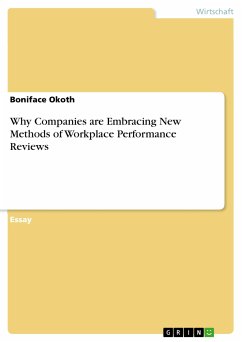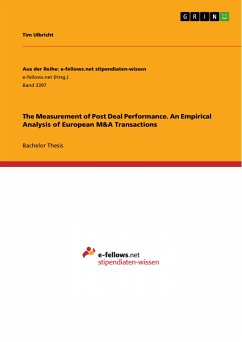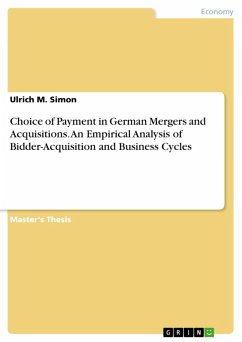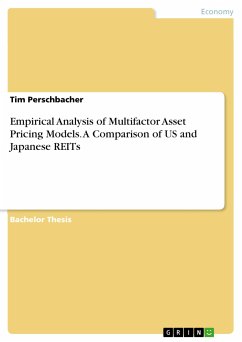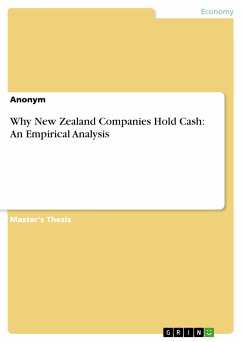
Why New Zealand Companies Hold Cash: An Empirical Analysis (eBook, PDF)

PAYBACK Punkte
0 °P sammeln!
Master's Thesis from the year 2004 in the subject Business economics - Operations Research, grade: 1.0 (A), UNITEC New Zealand (Business Administration), language: English, abstract: As Ross, Wester¿eld and Jordan (2000) report, at the end of 1997 a number of US companies piled up tremendous amounts of cash and marketable securities. At that time Ford held US $20.8 billion, GM US $14.5 billion, and Chrysler US $7.1 billion in liquid assets. This naturally raises the question for which reasons a ¿rm would hold such large amounts of cash, and if there is an optimal amount of cash holdings. Whi...
Master's Thesis from the year 2004 in the subject Business economics - Operations Research, grade: 1.0 (A), UNITEC New Zealand (Business Administration), language: English, abstract: As Ross, Wester¿eld and Jordan (2000) report, at the end of 1997 a number of US companies piled up tremendous amounts of cash and marketable securities. At that time Ford held US $20.8 billion, GM US $14.5 billion, and Chrysler US $7.1 billion in liquid assets. This naturally raises the question for which reasons a ¿rm would hold such large amounts of cash, and if there is an optimal amount of cash holdings. While this issue remained largely unexamined in the ¿nancial literature for years, recently, some researchers tried to explore the determinants of corporate cash holdings in the US (e.g. Opler, Pinkowitz, Stulz and Williamson, 1999) and in some European countries (e.g. Ferreira and Vilela, 2002). However, di¿erent reasons for holding cash might exist in countries with less developed economies. In this study, I examine the determinants of corporate cash holdings using a sample of companies listed at the New Zealand Stock Exchange in the 1980-2003 period. This work is guided by three theoretical models which are helpful in ¿nding the determining factors of cash holdings. However, these models partially disagree about how certain ¿rm characteristics äect liquid asset holdings. The trade-ö model assumes that companies weight the marginal bene¿ts and the marginal costs of holding cash to decide on their cash holdings. Thus, ¿rms have a target cash level to which they continuously try to adjust. Bene¿ts of holding cash are for example the reduction of transaction costs, and costs related to holding cash are mainly opportunity costs. The second model of corporate cash holdings is the ¿nancing hierarchy model. Ac-cording to this theory, ¿rms want to avoid costs induced by asymmetric information and, therefore, use cash from retained earnings to ¿nance investments before using debt or even equity.
Dieser Download kann aus rechtlichen Gründen nur mit Rechnungsadresse in A, B, BG, CY, CZ, D, DK, EW, E, FIN, F, GR, HR, H, IRL, I, LT, L, LR, M, NL, PL, P, R, S, SLO, SK ausgeliefert werden.




